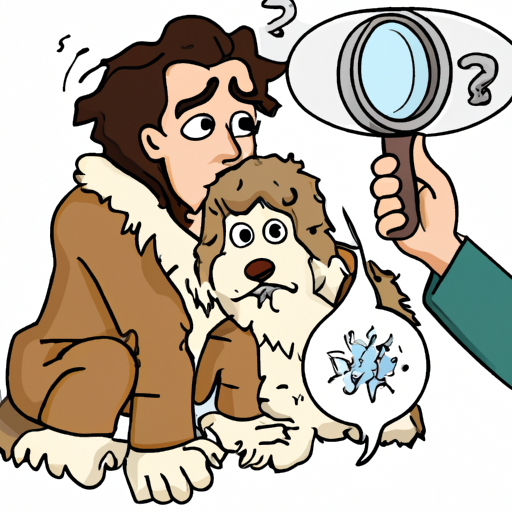As passionate pet parents, we strive to ensure our furry friends are in the best of health. One common issue that many dog owners encounter is the presence of white dandruff on their pets. This condition, known as seborrhea, can be quite concerning, causing discomfort for the dog and worry for the pet owner. This article aims to delve into the causes behind this condition, exploring possible remedies and preventative measures.
Table of Contents
- Understanding Canine Dandruff
- Causes of White Dandruff in Dogs
- Remedies and Preventative Measures
- Frequently Asked Questions
Key Takeaways
- Dandruff in dogs can be caused by various factors including allergies, poor nutrition, and skin infections.
- Regular grooming and a balanced diet can help prevent dandruff in dogs.
- It’s essential to consult with a vet if your dog’s dandruff persists despite home remedies.
Understanding Canine Dandruff
Dandruff in dogs, much like in humans, is characterized by the presence of flaky, dry skin that often results in itching and discomfort. The flakes are typically white or yellowish and can be seen in the dog’s fur or on surfaces where the dog often lies. While it’s normal for dogs to shed some skin cells, excessive flaking could indicate an underlying health issue that needs attention.
Causes of White Dandruff in Dogs
There are several reasons why your canine friend could be dealing with dandruff. Here are the most common causes:
-
Allergies: Dogs can be allergic to a variety of substances, from certain types of food to environmental factors like pollen or dust mites. These allergies can cause skin irritation leading to dandruff. Here is a comprehensive guide on dog allergies from the American Kennel Club.
-
Poor Nutrition: Just like humans, dogs need a balanced diet for optimal health. Lack of certain nutrients can lead to dry skin and subsequently, dandruff.
-
Skin Infections: Certain skin infections, both bacterial and fungal, can result in dandruff. Yeast infections, for instance, is a common cause of dandruff in dogs.
-
Parasites: External parasites such as fleas or mites can cause severe skin irritation and dandruff in dogs.
-
Underlying Medical Conditions: Certain medical conditions like hypothyroidism or Cushings disease can cause skin issues, including dandruff.
Remedies and Preventative Measures
Fortunately, there are several measures you can take to treat and prevent dandruff in your dog:
-
Regular Grooming: Regular brushing helps distribute natural oils throughout your dog’s coat, reducing dryness and dandruff. This article from OneTopDog offers some excellent grooming tips.
-
Balanced Diet: Feeding your dog a balanced diet rich in omega-3 fatty acids can help improve their skin health and minimize dandruff.
-
Hydration: Ensuring your dog has constant access to fresh water can help maintain skin hydration and reduce dandruff.
-
Consult a Vet: If your dog’s dandruff persists despite these measures, it’s essential to consult with a vet to rule out any underlying health issues.
Frequently Asked Questions
Q: Is dandruff in dogs a serious health issue?
A: While dandruff itself is not life-threatening, it can be indicative of an underlying health issue that needs attention. If your dog’s dandruff persists or is accompanied by other symptoms like hair loss or changes in behavior, it’s essential to consult with a vet.
Q: Can I use human dandruff shampoo on my dog?
A: No, it’s not advisable to use human dandruff shampoo on dogs as it can be too harsh for their skin. There are specially formulated dog shampoos available that are designed to help with dandruff. As always, it’s best to consult with a vet before trying any new treatments on your pet.
In conclusion, while dandruff in dogs can be concerning, understanding the causes and knowing the right preventative measures can go a long way in keeping your canine companion’s skin healthy. Remember, our furry friends rely on us for their wellbeing, so let’s give them the care they deserve. For more dog health tips, check out this article on OneTopDog.



